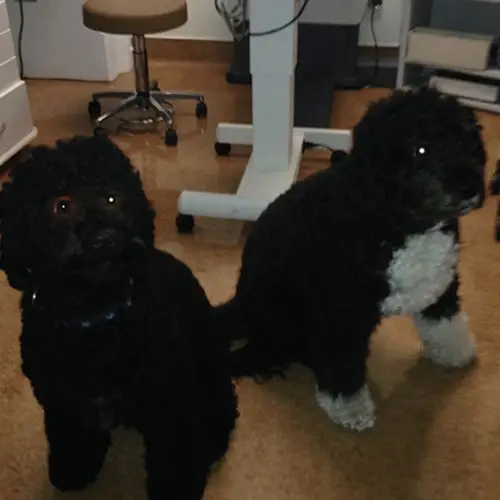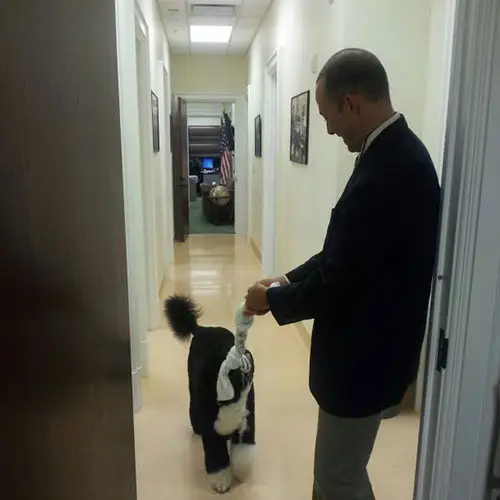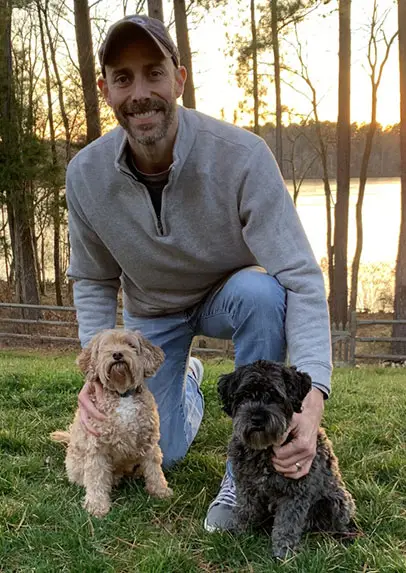Little did I know that when I was put in charge of eye care for the White House, I was also in charge of the First Dogs’ eye care as well. The White House Medical Unit had full training on how to muzzle and examine First Pets if the need arose. The first taste I had of this was when the WHMU staff told me that I would need to see Barney and Miss Beazely if anything eye-related happened to them. These were family dogs of President George W. Bush – black Scottish Terriers given to them by Bush Sr. after the 2000 election. I was skeptical and thought, “What am I to do with these dogs? I’m not a veterinarian.” I was assured not much was likely to happen in DC, but frequently at the ranch in Texas the dogs would get burrs or briars in or around their eyes. The likely scenario was if they were to return to DC with some burrs, I would be called upon. I prayed that day would never come. Luckily, it didn’t.
Bo and Sunny, the Obama’s Portuguese Water Dogs, were probably the most pristinely kept dogs I’ve ever seen (see photo). The breed comes from the Portuguese region of the Algarve, where these dogs were essentially first mates for fisherman, hence the “water” moniker. Herding fish in nets, retrieving tackle and acting as couriers from ship to ship in port were some common duties. Occasionally, the First Dogs would make their way over to White House Medical Unit, just across the big driveway called West Executive Avenue. It made for some monster tug of war battles (see photo).


Having the responsibility of dog eye care, I did read up on it. I was surprised to find many of the same eye afflictions that get us humans, also get dogs. Cataract, Glaucoma and Progressive Retinal Atrophy are common conditions in dogs that can rob them of their sight. This parallels the most common causes of vision loss in humans worldwide as well – cataract, glaucoma and macular degeneration.
Canine causes of vision loss
Cataracts: While cataracts are a natural clouding of the lens in the eye and can be essentially “cured” with cataract extraction, glaucoma and progressive retinal atrophy cause permanent blindness.
Glaucoma is progressive degeneration of the optic nerve and can be due to a variety of causes, including elevated eye pressure, poor blood flow or genetically early death of the cells.
Progressive retinal atrophy is a group of inherited diseases with age risk factors akin to retinitis pigmentosa (RP) and macular degeneration in humans.
In non-primate animals, the term “area centralis” rather than “macula” is used to define the central retina containing the highest photoreceptor density (your best visual acuity). The term macular degeneration in dogs is not technically used because there is no region by that name. These retinal degenerations begin to affect dogs around 6-8 years old.
Much like RP, there typically is loss of night vision initially, followed by daytime and central vision at variable rates. Like in humans, retinal disease in canines has a number of genetic mutations. For humans, genome wide associations studies (GWAS) are conducted to identify these genes, and researchers are also mapping the genes and mutations for these diseases in dogs. This will bring about treatments in the form or gene therapy to prevent blindness in our furry friends.
If you notice your aging dog more hesitant to jump off the couch, increasingly bumping into things or a showing a greater level of anxiety in general, this could be an indication of deteriorating vision and would recommend having your pet evaluated by a TRAINED veterinarian.
The First Dogs did not experience these issues to my knowledge and both Bo and Sunny and the Bushes’ dogs survived their owners’ presidencies without any major eye problems. Sadly, Barney passed away in February 2013 and Miss Beazley in May 2014.
As a dog owner myself, it was a valuable experience to be the First Dogs’ optometrist. We have two canine additions to our family, a Cavapoo named Buford and a Miniature Schnauzer named Mosby (see photo). They add so much personality and fun to our household. It wouldn’t be the same without them.

A great tribute to dogs was given by George Graham Vest (1830-1904) who served as U.S. Senator from Missouri from 1879 to 1903. His closing argument against a man who had killed his client’s dog was all he needed to sway the jury in favor of his client.
“….And when the last scene of all comes, and death takes his master in its embrace and his body is laid away in the cold ground, no matter if all other friends pursue their way, there by the graveside will the noble dog be found, his head between his paws, his eyes sad, but open in alert watchfulness, faithful and true even in death.”
The full speech, which is definitely worth reading if you’re a dog lover, can be found here: https://www.historyplace.com/speeches/vest.htm











